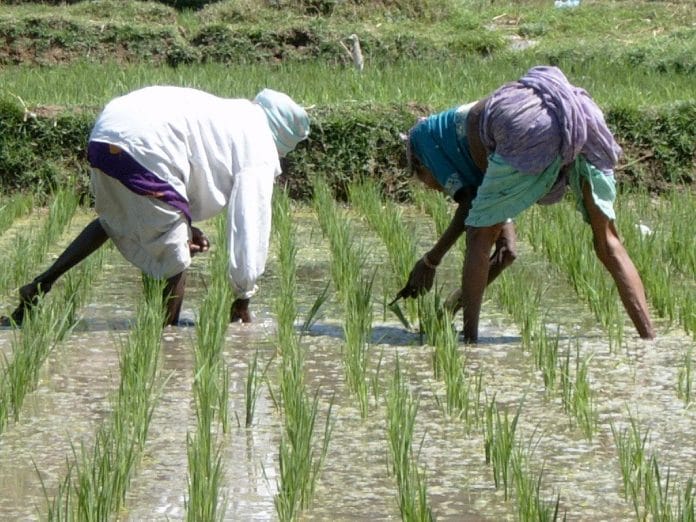Modi wants to address rural discontent and be better prepared for polls than Vajpayee was. That could mean populism too.
On a day when the BJP lost all three by-elections in Rajasthan, the Narendra Modi government rolled out its first major organised intervention in this year’s budget to fix the rural economy.
In other words, it’s perhaps, the country’s first full majority Right-wing government’s biggest social welfare budget, which even boasts of the world’s largest government-sponsored healthcare scheme. This will cover 10 crore families.
But setting aside staggering numbers like how this amounts to a Rs 14 lakh-core-infusion into the rural sector, it’s important to understand the governance approach. And how this is different from the Congress, the original political manipulators of the rural vote.
Clearly, the Saurashtra setback in Gujarat has served as a wake-up call to the government. The result: an outline of the ‘Modi way’ to deal with rural distress.
Conceptually, the creation of Gramin Agriculture Markets underlines this approach. It’s an upgrade of 22,000 rural haats by way of improving physical infrastructure using MGNREGA and other government schemes. A clever way to use existing well-funded schemes to create fresh infrastructure.
But the key point in the fine print is that these markets will operate outside the regulations of the APMC Act. This means the powerful lobby of APMC traders are being looped out under the working assumption that they don’t ensure fair market price to neither the farmer nor consumer.
In doing so, however, the government will have to deal with the challenge of providing better infrastructure at the farm gate.
To make this work on the ground it aims to rely more on farmer producer companies than state government-influenced cooperatives. Thursday’s Budget has ensured that both are now at par by way of exemptions.
This change will, most likely, also manifest in the fine print of Operation Greens, a mission for onions, tomatoes and potatoes to be modelled on the lines of Operation Flood.
The farmer producer companies, unlike the co-operatives in Operation Flood, may be the mainstay of Operation Greens. Reason: companies ensure better profit because they are professionally run.
The other stump of this approach is to get the farmer to diversify, to move beyond crops, into fruits, vegetables and other exportable commodities. Which is why this stress on the Rural Livelihood Mission. But this is easier than done and will again require creation of new infrastructure.
Yet, this is what the budget seeks to sell – a transformation of farm gate economics, the Modi way.
The government is also counting to build on the success it has had with something like the Ujjwala scheme in rural areas. The same kind of success is being anticipated with the Saubhagya scheme to supply electricity to every rural household.
Add to that the Pradhan Mantri Awas Yojna and the new health scheme, Ayushman Bhava, to it and you can begin to imagine the 14-lakh crore big picture.
Again, what’s come of use is the data from the Social Economic Caste Census which will form the basis for identifying the 10 crore families for Ayushman Bhava, just like for Ujjwala, PM Awas Yojna and Saubhagya schemes.
But will this assured healthcare come at the cost of destroying the primary healthcare system?
This is what happened with the Aarogyasri scheme piloted by late Andhra Pradesh Chief Minister Rajasekhara Reddy. It looked like it was working well and then fell under the weight of its own cash burden of soaring insurance premiums and increasing hospital bills.
Still, it must be said that unlike the last BJP PM Atal Bihari Vajpayee, who was politically blindsided by brewing rural discontent in the penultimate year of his term, Modi wants to be better prepared.
With this budget, he has set the stage to make any number of pro-poor, deemed populist announcements, if necessary, ahead of 2019 elections.
The good part is that his government has so far resisted this temptation, probably because that was the Congress way.







When was it that human beings worked for others , not for self ? For instance , even Buddha left his kingdom for what? For others ? Not at all. He left his kingdom to find certain answers to the greatest mystery of the world and thereby get bliss or peace for himself through remedy from “Dukh”. When he was successful in finding a remedy for “Dukh” nature of “Sansar” and thereby earn peace , it was for himself. The idea that he shared that remedy with mankind comes next automatically. But fact remains that whatever he did , it was for himself. We must understand life the way Nature has made it and not the way we wish it to be. Tell this writer. Were we consulted as to where and in what form we would like to be born ? We even don’t know where were we before birth , a complete mystery. ” Sansar ki har sei ka ek hi afsana hai , dundh mein aana hai aur dundh mein jana hai” – this was a perfect lesson in movie “Dundh” that was screened way back , probably in seventees. Briefly speaking , if saint or yogi like Buddha were working for self , can a political party be said to be working for others? Just ponder over and enjoy life without confusion.
Much simpler to dismantle the APMCs. Trust the good sense of the average farmer to choose the channel by which his produce reaches the urban consumer, yields him a higher proportion of the retail price. Allow corporates, including foreign ones, to step in as more efficient intermediaries, setting up cold chains and better transport and storage infrastructure. Market solutions vs state chaperoning is where voters had expected something markedly different from this government. Instead, the Congress is adopting soft Hindutva and the BJP hard socialism.